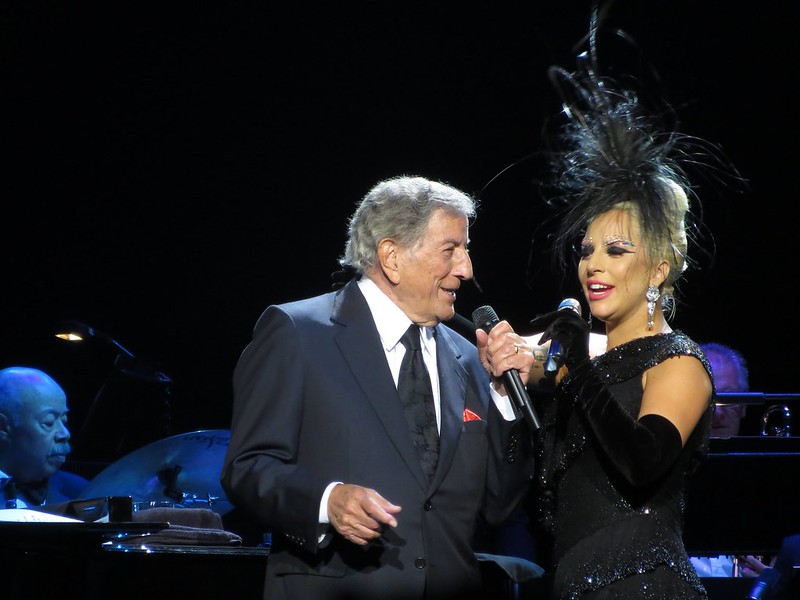Why Tony Bennett Embodies the Power of Music

At 95 years old, the American jazz legend Tony Bennett - known for swinging hits like "I Left My Heart In San Francisco" and "The Best Is Yet To Come" - has been charming generations of listeners and audiences for close to seven whole decades, having recently shattered a Guinness World Record by becoming the oldest person to release an album of new material.
His 61st and final studio album, Love for Sale, was released on October 1 and is a collaboration with another musical icon in her own right, Lady Gaga, who has worked with Tony Bennett since 2011 and shared the stage with him at his final concert back in August.
But what’s even more incredible than breaking the record is that Tony Bennett continued to pursue his passion for music and remain artistically productive in spite of being diagnosed in 2017 with Alzheimer’s - a type of dementia - that makes brain cells and connections degenerate and die, eventually causing permanent damage that results in memory loss and confusion. In fact, in a recent 60 Minutes interview with Lady Gaga, Anderson Cooper was amazed to learn that TonyBennett still knows the lyrics to every song he sings.
“When that music comes on, something happens to him [Bennett], he knows exactly what he’s doing,” Gaga tells Cooper. Similarly, in an interview with Guinness, she commented on how singing brings out the youthfulness of the award-winning singer, saying: “I see a young boy every time I sing with him, and it just makes the experience of singing so freeing.”
However, as we’ve explored in great detail in an earlier Feed.fm blog entry, the cause of the positive effect that music appears to have on Mr. Bennett is not just anecdotal, but actually deeply rooted in science. Here are just a few reasons why this is the case:
- Music has the ability to rewire our brains. According to a 40-year retrospective of related research, music can deliver long-term physiological results in people, effectively rewiring our brains in a process known as neuroplasticity. Neuroscientists offer the following shorthand for this re-wiring phenomenon: “Neurons that fire together, wire together.” By pairing music with everyday activities, Alzheimer’s patients can develop a rhythm that helps them to recall the memory of that activity, rewiring their brains and improving cognitive ability over time. Furthermore, a University of Helsinki study demonstrated that music enhances alertness and directly stimulates damaged areas of the brain after a stroke.
- Music stimulates numerous parts of the brain. In the aforementioned 60 Minutes special, the neurologist who diagnosed Tony Bennett with Alzheimer’s, Dr. Gayatri Devi, affirms that music engages multiple different parts of the brain. She says: “So there's the auditory cortex for hearing. There is the part of the brain that deals with movement and dance. There is the visual system that gets engaged. So it's (music is) kind of like a whole-brain-activator.” She also notes that in Bennett’s case, his musical memory and ability to be a performer are hard-wired parts of his brain, so “even though he doesn't know what the day might be or where his apartment is, he still can sing the whole repertoire of the American Songbook and move people.”
- Music lives in the emotional parts of the brain. While music activates multiple brain regions, much of it is processed in the emotional center of our brains, the amygdala. The renowned neurologist and author of Musicophilia, Oliver Sacks, once said that, “Music evokes emotion, and emotion can bring with it memory… it brings back the feeling of life when nothing else can.” Why this matters in relation to Alzheimer’s is that according to HOPE Hospice & Care Giving, “while cognition and other functions may decline, the brain’s amygdala is often intact to the end of life. With the emotional center still open for business, the person experiences feelings.” In short, this means that the emotional effects felt by music can still be felt by patients even in progressive cases of Alzheimer’s.
Here at Feed Media Group, we continue to be amazed at the power music has in all walks and stages of life, including the storied life of Tony Bennett, who we feel embodies this power. This is not only why we continue to research music’s positive effects on overall health, but also why we are so committed to making music our business and making it more accessible to as many people as possible. We can’t wait to see how the power of music will continue to help us all live better and fuller lives.
Photo Credit: Marced27 / Flickr

 2 min
2 min